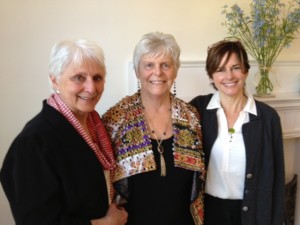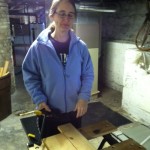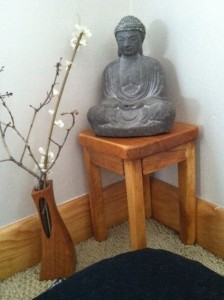Yesterday morning we were in a snow-globe of lake-effect fluff, drifting all over. It was beautiful. To me these days, most things are, well, a revelation, meaning that being alive is—shall I say just great? That sounds so Panglossian. I mean it’s all okay, snow or sun, no joke. It’s April 3. Melting snow is soaking some moisture down where it needs to be, after our dry, dry summer last year. The tart cherries should be good this year. And our two good friends, Myrna and Joan, from Traverse City got married in D.C. yesterday after 20 years living as a committed gay couple with no legal protections or civil recognition. A great day for them—ages 72 and 80. My daughter Kelly lives in D.C. and attended (she's in the photo), to represent us.  And I finished my 25 sessions of daily radiation yesterday. I imagine I feel better already, not having those rays daily directed straight at my digestive system. I’ve felt pretty punk most of the time, and increasingly tired. I’m taking long afternoon naps and going to bed early. Next is three weeks (3 sessions) of “internal” radiation, to target the scar tissue around the hysterectomy surgery. Then three rounds, three weeks apart, of chemo again.Will I be “cured?” The radiation oncologist carefully says we “hope to keep the cancer away.” This is accurate. It was always accurate even when we didn’t know it, that what we do moment-by-moment is collapse and resurrect, collapse and resurrect. We hope the balance hangs in our favor a good long while. The mind is good at ignoring, mostly, our end. But at some cost, it seems to me now. There is a “dearest freshness deep down things,” as the poet Hopkins puts it, that’s only touched when our feet are (metaphorically, at least) unshod, when they can feel the soil we come from and return to.
And I finished my 25 sessions of daily radiation yesterday. I imagine I feel better already, not having those rays daily directed straight at my digestive system. I’ve felt pretty punk most of the time, and increasingly tired. I’m taking long afternoon naps and going to bed early. Next is three weeks (3 sessions) of “internal” radiation, to target the scar tissue around the hysterectomy surgery. Then three rounds, three weeks apart, of chemo again.Will I be “cured?” The radiation oncologist carefully says we “hope to keep the cancer away.” This is accurate. It was always accurate even when we didn’t know it, that what we do moment-by-moment is collapse and resurrect, collapse and resurrect. We hope the balance hangs in our favor a good long while. The mind is good at ignoring, mostly, our end. But at some cost, it seems to me now. There is a “dearest freshness deep down things,” as the poet Hopkins puts it, that’s only touched when our feet are (metaphorically, at least) unshod, when they can feel the soil we come from and return to. My step-daughter Amy visited this last week. She teaches at Lane College in Eugene, Oregon, and gave up most of her spring break to be here for me and for her dad. I was too tired to do much more than take a jaunt to the local museum and go out to eat once, but it was great to have her here. She built me a little Buddha stand.
My step-daughter Amy visited this last week. She teaches at Lane College in Eugene, Oregon, and gave up most of her spring break to be here for me and for her dad. I was too tired to do much more than take a jaunt to the local museum and go out to eat once, but it was great to have her here. She built me a little Buddha stand. Sometime I’ll write exclusively about my deep affection for both Christianity and Buddhism, how each has mattered to me. I’m steeped in both cultures. I’ve loved the images, the rituals, the glorious language of the Christian church. After my years on the cushion, those images, etc., haven’t gone away. Who would want them to? They become, shall I say, “seen through” in their provisionality. In the same way, I suspect, that St. Teresa of Avila, Hildegard of Bingen, St. John of the Cross, and the Buddha, saw through to simply what is, was, and always will be. It’s just the plain shining, gritty truth of things, with or without my or anyone else’s smart-ass input.I just read a fine interview of Christian Wiman, the editor of Poetry Magazine by my old friend Jeanne Murray Walker in Image Magazine. Wiman says, “Silence is the necessary soil for poetry, and the blight that eats into our surest words. Silence is the only sound God ever makes, and it is the often crushing condition of his absence. Every once in a while you encounter a work of art that silence has truly and permanently entered, like fallen autumn leaves that, riddled with holes, are on their way to being entirely light.”Corollary Issue: Why I Have this Cancer: Thank heaven for the researchers and curers. That’s not what I mean. I mean metaphysically why. I think of Job, who refused to ask. And I think of this, from John Donne’s Sermon CXXX:It is an execrable and damnable monosyllable,why; it exasperates God, ruins us.
Sometime I’ll write exclusively about my deep affection for both Christianity and Buddhism, how each has mattered to me. I’m steeped in both cultures. I’ve loved the images, the rituals, the glorious language of the Christian church. After my years on the cushion, those images, etc., haven’t gone away. Who would want them to? They become, shall I say, “seen through” in their provisionality. In the same way, I suspect, that St. Teresa of Avila, Hildegard of Bingen, St. John of the Cross, and the Buddha, saw through to simply what is, was, and always will be. It’s just the plain shining, gritty truth of things, with or without my or anyone else’s smart-ass input.I just read a fine interview of Christian Wiman, the editor of Poetry Magazine by my old friend Jeanne Murray Walker in Image Magazine. Wiman says, “Silence is the necessary soil for poetry, and the blight that eats into our surest words. Silence is the only sound God ever makes, and it is the often crushing condition of his absence. Every once in a while you encounter a work of art that silence has truly and permanently entered, like fallen autumn leaves that, riddled with holes, are on their way to being entirely light.”Corollary Issue: Why I Have this Cancer: Thank heaven for the researchers and curers. That’s not what I mean. I mean metaphysically why. I think of Job, who refused to ask. And I think of this, from John Donne’s Sermon CXXX:It is an execrable and damnable monosyllable,why; it exasperates God, ruins us.
My Wobbly Bicycle, 18
in Archive
